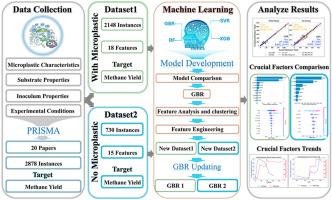基于机器学习的微塑料诱导厌氧消化参数变化影响甲烷产量的分析
IF 8.4
2区 环境科学与生态学
Q1 ENVIRONMENTAL SCIENCES
引用次数: 0
摘要
微塑料(MPs)对用于从受污染的有机废物中回收能源的厌氧消化(AD)过程提出了重大挑战。考虑到当MPs存在时,不同研究的最佳AD条件差异很大,一个强大的预测模型对于准确评估这些复杂的影响至关重要。这项研究使用了四种机器学习算法来预测甲烷产量,使用了两个数据集——一个有MPs,一个没有。其中,梯度增强回归的预测精度最高,无MP污染系统的检验R2为0.996,有MP污染系统的检验R2为0.998。然后通过去除冗余和低重要性特征进一步优化该模型,提高其预测能力。特征重要性分析表明,消化时间和底物有机质含量是与甲烷产量正相关的关键参数。在MPs存在的情况下,底物pH和接种总固体量成为关键因素,部分依赖图提供了对其最佳条件的更深入了解。该研究为MPs对甲烷产生的复杂影响提供了新的视角,这可以为MPs污染环境下AD过程的优化提供信息。本文章由计算机程序翻译,如有差异,请以英文原文为准。

Machine learning-based analysis of microplastic-induced changes in anaerobic digestion parameters influencing methane yield
Microplastics (MPs) present significant challenges for anaerobic digestion (AD) processes used in energy recovery from contaminated organic waste. Given that optimal AD conditions vary widely across studies when MPs are present, a robust predictive model is essential to accurately assess these complex effects. This study applied four machine learning algorithms to predict methane yield using two datasets—one with and one without MPs. Among these, gradient boosting regression demonstrated the highest prediction accuracy, with testing R2 values of 0.996 for systems without MP pollution and 0.998 with MP pollution. This model was then further optimized by removing redundant and low-importance features, refining its predictive power. Feature importance analysis revealed that digestion time and substrate organic matter content were key parameters positively correlated with methane production. In the presence of MPs, substrate pH and inoculum total solids emerged as critical factors, with partial dependence plots offering deeper insights into their optimal conditions. This research offers new perspectives on the intricate effects of MPs on methane production, which could inform the optimization of AD processes in environments contaminated by MPs.
求助全文
通过发布文献求助,成功后即可免费获取论文全文。
去求助
来源期刊

Journal of Environmental Management
环境科学-环境科学
CiteScore
13.70
自引率
5.70%
发文量
2477
审稿时长
84 days
期刊介绍:
The Journal of Environmental Management is a journal for the publication of peer reviewed, original research for all aspects of management and the managed use of the environment, both natural and man-made.Critical review articles are also welcome; submission of these is strongly encouraged.
 求助内容:
求助内容: 应助结果提醒方式:
应助结果提醒方式:


